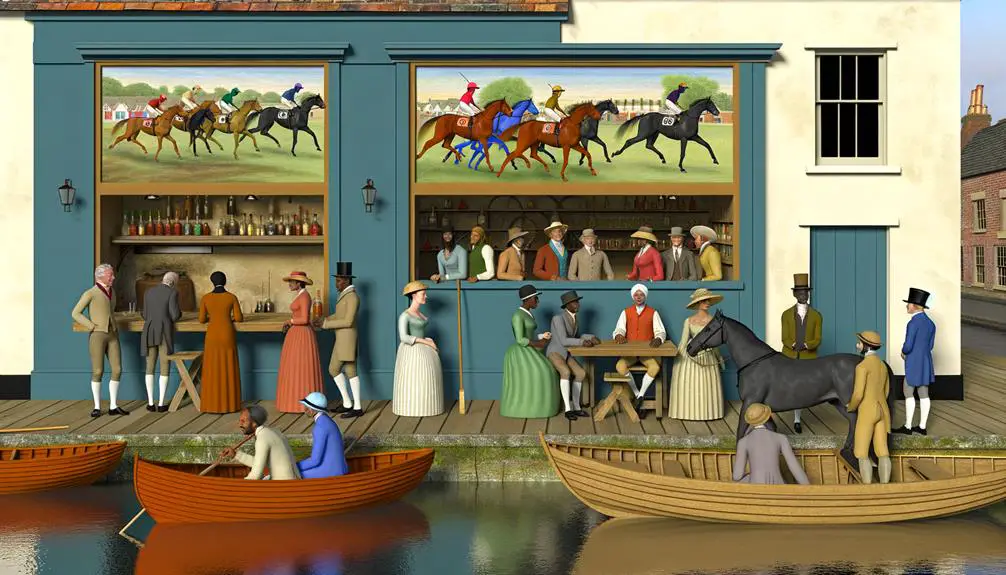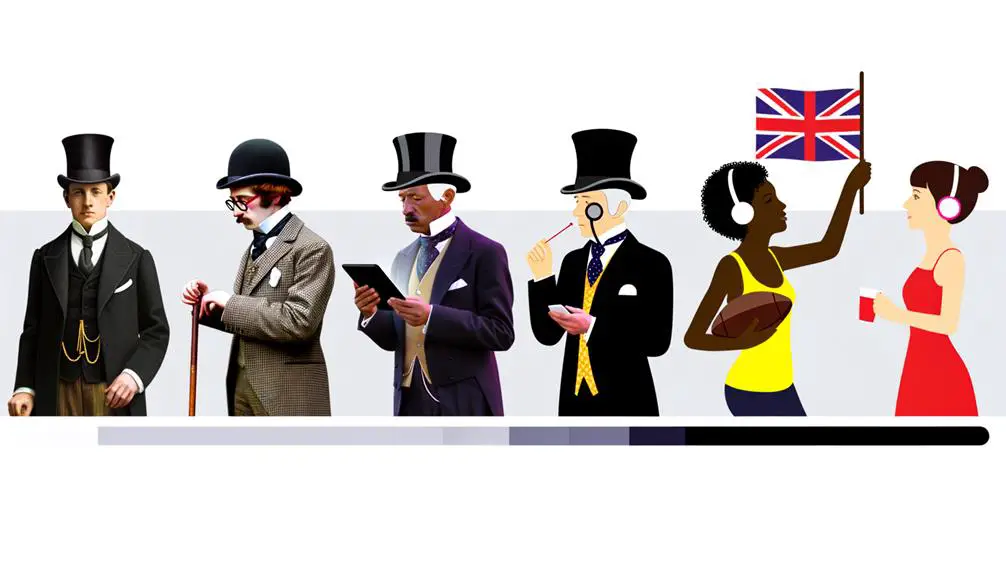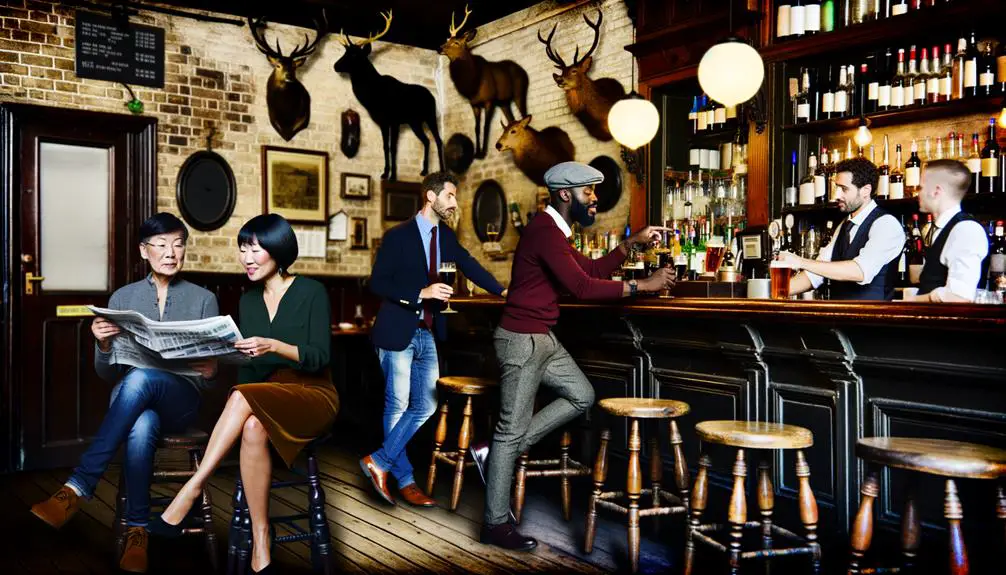In British slang, you'll find 'punter' primarily denotes a customer or user, especially in contexts of leisure or transactions. Originally emerging in the late 19th century with nautical and gambling connotations, its usage has greatly broadened. The term's evolution mirrors societal shifts and linguistic trends, shifting from gamblers to a general enthusiast or consumer. Regionally, its meaning nuances, reflecting the cultural diversity of the UK. Additionally, 'punter' carries varied societal implications, sometimes used derogatorily, particularly in the sex industry. Its multifaceted nature underscores the complexity of British slang. Grasping 'punter' offers a deeper insight into British cultural nuances.
Key Takeaways
- 'Punter' in British slang commonly refers to customers, users, or enthusiasts of a particular service or activity.
- Originally linked to gambling, especially on horse races, it now has broader applications across various contexts.
- The term can carry cultural nuances and regional variations within the UK, affecting its meaning slightly.
- In some contexts, especially relating to the sex industry, 'punter' can have derogatory connotations.
- 'Punter' reflects aspects of British humor, social interactions, and can foster a sense of inclusion or camaraderie.
Origins of 'Punter'

Tracing its origins, 'punter' first emerged in British slang during the late 19th century, denoting someone who gambles or places a bet. This term's linguistic roots are fascinating and multifaceted, revealing a rich tapestry of historical and cultural influences that have shaped its usage and understanding over time.
Initially, 'punter' was deeply intertwined with nautical connections, a nod to the risky and unpredictable nature of gambling, much like steering through treacherous waters.
Delving deeper, the term 'punter' finds its etymological origins in the Latin word 'ponto,' meaning a flat-bottomed boat. This nautical term was absorbed into English, evolving over time to describe the act of propelling such a boat by pushing a pole against the riverbed. This physical action required both skill and an intimate understanding of the river's currents—qualities that gamblers, or 'punters,' metaphorically navigate in the uncertain waters of betting.
The shift from a nautical term to British slang encapsulates a broader societal trend where gambling became more pervasive, mirroring the changing currents of economic and social life in the UK. The term 'punter' hence carries with it layers of meaning that extend far beyond its initial use, embodying the spirit of risk, calculation, and adventure that characterizes the act of gambling.
Analyzing the origins of 'punter' offers a scholarly glimpse into the complex interplay between language, culture, and history. It's a reminder of how words can evolve, reflecting changing societal norms and practices, while also retaining a connection to their linguistic and cultural heritage.
Evolution Over Time

As the term 'punter' journeyed through time, its meaning underwent significant transformation, reflecting shifts in societal attitudes and practices. Initially rooted in the lingo of gambling and horse racing, the term's adaptation reveals much about the changing landscape of language influence and societal norms. This evolution is particularly evident when examining the term within the sporting context, where it first gained prominence.
Historically, 'punter' referred to someone who gambled, especially on horse races, and its usage was mainly confined to such settings. However, as sporting events became more intertwined with social and cultural practices, the term's scope broadened. This shift underscored the dynamic nature of language, where words stretch and mold to fit new contexts and meanings.
The influence of language on the term's evolution can't be understated. As British slang, 'punter' absorbed nuances from various dialects and subcultures, enriching its semantic depth. This linguistic cross-pollination, coupled with societal changes, propelled 'punter' beyond its original confines, allowing it to capture more than just a gambling enthusiast.
In the sporting context, 'punter' began to signify not just a bettor, but an aficionado, someone deeply engaged with the sport, irrespective of gambling. This alteration marks a significant departure from its origins, showcasing how societal evolution affects language. The term's journey from a narrow gambling reference to a broader indication of enthusiasm and engagement illustrates the fluidity of language and its capacity to mirror societal shifts.
Contemporary Uses

Today, 'punter' has evolved beyond its gambling roots to encompass a wide array of applications in everyday British vernacular. You'll find that in contemporary settings, the term now broadly refers to customers or users of a service, particularly in informal contexts. This shift reflects broader social and linguistic trends, underscoring the fluidity of slang and its capacity to adapt to changing societal norms.
Analyzing punter profiles demonstrates this versatility. For instance, a 'punter' might be someone attending a music festival, a diner in a casual restaurant, or a patron at a local pub. Each scenario underscores a common theme: individuals engaging in leisure or transactional activities, often with a hint of casual, unpretentious participation. This broad application marks a significant departure from the term's original association with gambling, illustrating the dynamic nature of slang and its role in reflecting societal changes.
A slang comparison further highlights the term's unique position within British English. Unlike its counterparts in other English-speaking regions, 'punter' carries a distinctively British connotation, imbued with cultural nuances that are difficult to translate directly. This specificity showcases the term's embeddedness in the texture of British life, resonating with a sense of place and identity that's uniquely its own.
Regional Variations

Exploring the regional variations of the term 'punter' reveals how its meaning and usage subtly shift across different parts of the UK, offering insights into local dialects and cultural contexts. You'll find that the nuances in the term's interpretation not only enrich your understanding of British slang but also highlight the diversity within the English language itself.
The term's core essence remains largely intact throughout the UK, signifying someone who gambles or takes a chance, often in a sports or betting context. However, regional dialect differences and slang synonyms introduce a tapestry of meanings that vary from one area to another. The following table illustrates how 'punter' and its equivalents are woven into the linguistic fabric of various UK regions:
| Region | Slang Synonym | Contextual Nuance |
|---|---|---|
| London | Punter | Primarily used to describe customers, especially in contexts like markets or informal trade. |
| Scotland | Bettor | Emphasizes the gambling aspect, particularly in relation to horse racing and sports betting. |
| Northern England | Client | Often used in the service industry, hinting at a slightly more formal relationship than in southern slang. |
| Wales | Wagerer | Similar to Scotland, with a strong focus on the act of betting itself. |
| Southwest England | Patron | Sometimes used interchangeably with 'punter', especially in hospitality and entertainment sectors. |
Through this analysis, you're invited to appreciate the dialect differences across the UK. Each region not only has its unique slang synonyms for 'punter' but also distinct cultural connotations that enrich the term's meaning within their respective dialects.
Cultural Impact

The cultural impact of the term 'punter' extends beyond mere vocabulary, shaping social interactions and perceptions across various UK communities. It's not just a word; it's a lens through which social dynamics are both viewed and constructed. You'll find its influence is multifaceted, deeply intertwined with the fabric of British culture, and reflects a unique blend of humor, camaraderie, and sometimes, social stratification.
Analyzing its role, you'll see that 'punter' carries with it an array of social perceptions. In some circles, it's a badge of the common man, embodying a sense of solidarity among those who frequent pubs, sports events, or betting shops. It's a term that levels the playing field, fostering a sense of inclusion and belonging. Yet, in other contexts, it might subtly underscore distinctions, hinting at naivety or lack of sophistication. This duality is fascinating, highlighting the term's ability to both unite and differentiate within the tapestry of British society.
Media representation plays an essential role in perpetuating these perceptions. From television shows to newspapers, the portrayal of the 'punter' often oscillates between the affectionate and the patronizing. This dichotomy not only reflects but also reinforces societal attitudes, making the term a powerful tool in the media's arsenal for shaping public opinion.
Frequently Asked Questions
How Does the Term "Punter" Intersect With Legal and Ethical Considerations in Industries Like Gambling and Adult Entertainment?
When you're looking at how 'punter' intersects with industries like gambling and adult entertainment, you're delving into complex issues of consumer trust and regulatory challenges. These sectors heavily rely on maintaining a delicate balance between providing services that attract punters and adhering to legal and ethical standards.
Ensuring this balance requires a deep understanding of both consumer behavior and the regulatory landscape, highlighting the significance of trust and compliance in sustaining these industries.
In What Ways Has the Portrayal of "Punters" in British Media (Films, Television, Books) Influenced Public Perception and Stereotypes?
You're exploring how British media's portrayal of 'punters' has shaped public views. This journey investigates cultural origins and media evolution, scrutinizing how films, TV, and books reflect and shape societal attitudes.
Are There Specific Educational or Socioeconomic Demographics Associated With the Use of the Term "Punter" in Contemporary British Society?
You're diving into how language evolution and regional variations influence the term 'punter' in contemporary British society. It's not just about the word itself, but who's using it and where.
You'll find it's not strictly tied to specific educational or socioeconomic demographics. Instead, its usage varies widely across different areas, reflecting local linguistic trends.
This analysis highlights the complexity of tracking slang within the social fabric of the UK.
How Do Non-British English Speakers Perceive the Term "Punter," and What Misunderstandings or Confusions Might Arise When It's Used in International Contexts?
You might find that non-British English speakers often stumble upon cultural misunderstandings and language barriers when encountering the term 'punter.' Without the specific British context, you could misconstrue its meaning, leading to confusion.
It's important to recognize how regional slang can influence perception and communication in international settings, potentially skewing the intended message. This awareness helps navigate the subtleties of cross-cultural interactions, ensuring clarity and reducing misinterpretations.
Can the Term "Punter" Have Positive Connotations, and in What Scenarios Is It Used to Express Admiration or Respect Rather Than Derision or Neutrality?
You're exploring a linguistic sea, where 'punter' sails with varied flags. Originally, it denoted gamblers or risk-takers, evolving to broadly refer to customers or users.
In certain contexts, 'punter' harbors admiration, especially when highlighting an individual's discerning choice or daring spirit. This positive spin shines in arts or sports, where being a 'punter' signifies a connoisseur's taste or a supporter's passion.
'Punter admiration' isn't just a phrase; it's a recognition of value and enthusiasm.
Conclusion
In the grand tapestry of British vernacular, 'punter' has journeyed a remarkable path, akin to a ship sailing the vast and changing seas. Initially anchoring in the harbors of gambling and risk-taking, it has since sailed into broader societal waters, encompassing anyone within the consumer landscape.
This linguistic voyage not only showcases the dynamic nature of language but also mirrors the evolving identity of its speakers, reflecting a rich cultural heritage and the adaptability of human expression. Through this allegory, 'punter' embodies the essence of linguistic evolution, painting a vivid picture of its enduring impact on British culture and beyond.







